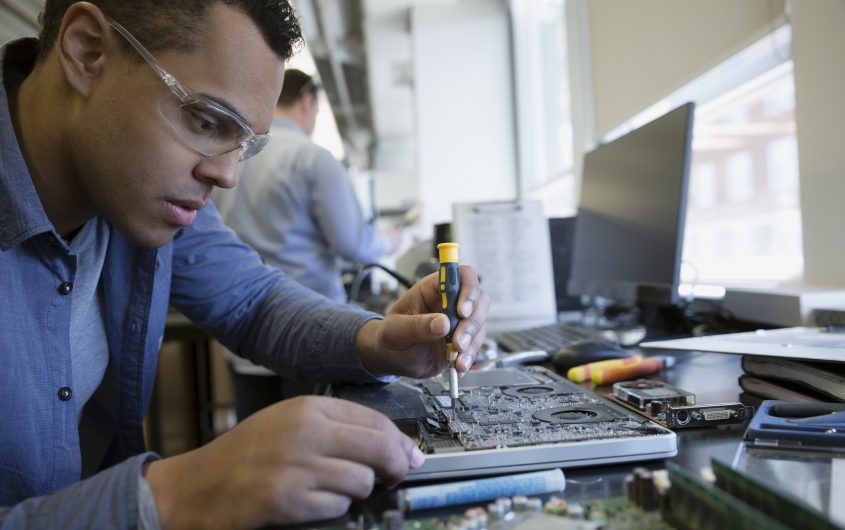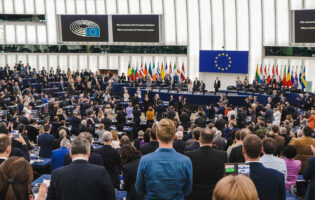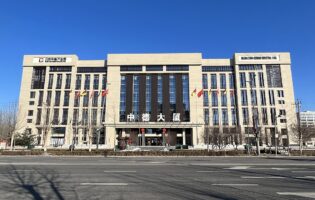
Getty Images
Inclusive Workforce Education: Opportunities for International Economic Cooperation with the New U.S. Administration

Elizabeth Hotary
Communications Officer
Elizabeth Hotary is the Communications Officer at AICGS. She creates and implements communications strategies, coordinates publishing activities, and manages media relations. She contributes to AICGS research on workforce education and immigration and integration and has co-led AICGS study tours across the United States and Germany. Before joining AICGS, she taught English at a secondary school in Herne, Germany, as part of the Fulbright Program. During her time as a Fulbrighter, she also volunteered with the U.S. Consulate Düsseldorf’s MeetUS program, where she traveled to schools across North Rhine Westphalia to speak with secondary school students about the United States. She has previous experience at the University of Denver's Josef Korbel School’s Office of the Dean and WorldDenver, a nonprofit global affairs organization.
Ms. Hotary received her MA from the Josef Korbel School of International Studies at the University of Denver, where she was a Marc Nathanson Fellow. She graduated magna cum laude from the University of Arkansas with degrees in International Relations, European Studies, and German. She is an alumna of the Aspen Seminar for Young European Leaders "Next-Gen Europe: Leading for Values."
__
After the protectionist rhetoric of the Trump campaign and discord between Treasury Secretary Steven Mnuchin and the rest of the G20 finance ministers on free trade in March, the outlook in Europe regarding international economic cooperation with the United States has been pessimistic. Much has been made of the U.S.’ new aversion to free trade and globalization, and U.S. allies are stressing other areas of international economic cooperation as they begin to better understand the priorities and policies of the Trump administration. After the labor and employment ministers meeting of the G20 on May 19 in Bad Neuenahr-Ahrweiler, Germany, workforce education emerged as a major point of consensus and opportunity for cooperation between the Trump administration and the international community in general, and Germany in particular.
When Angela Merkel came to the White House on her first visit, she spent a significant amount of time highlighting the success of German corporations in the United States and the advantage of German apprenticeship programs to U.S. workers. Germany’s dual vocational education program has long been a key part of its soft power, and policymakers continued to highlight it at the G20 in Bad Neuenahr-Ahrweiler. It shouldn’t be surprising that Secretary of Labor Alex Acosta’s first big speech unveiling priorities was on apprenticeships, and that it took place in Germany. In addition to official meetings, Secretary Acosta got hands-on German apprenticeship experience at a Thyssen Krupp plant, posting photos to his Twitter feed alongside statements that affirmed commitment to “demand-driven education that gives men and women the skills they need now—and also prepares them to be agile, responsive life-long learners who can acquire new skills in our ever-changing workplace.”
Germany’s G20 employment meeting wasn’t just about apprenticeships. Federal Minister of Labor and Social Affairs Andrea Nahles named the meeting “Towards an Inclusive Future: Shaping the World of Work.” While apprenticeships were front and center, the ministers also addressed the topics of women in the workplace and labor market integration of migrants and refugees. Secretary Acosta gave statements about including women in the workplace and encouraging them to take apprenticeships; inclusion of other groups was not front and center in his messaging from the G20. However, the declaration tackles these issues in depth, and the statements coming from the G20 group repeatedly emphasize inclusivity and opportunity for all.
It is clear that crucial policymakers at the Department of Labor and the White House see demand-driven apprenticeships as an essential way to provide businesses with qualified employees and provide quality jobs to American workers. However, the true test is that of collaboration. The department should work across the executive branch and with the private sector and educational institutions to promote and expand programs such as ApprenticeshipUSA. The United States should continue to look at other models of apprenticeships to improve its own systems. And finally, U.S. officials should reflect on the other issues of the G20 employment meeting and consider ways to promote gender and racial diversity in apprenticeship programs, granting all workers in America access to high quality, secure, twenty-first century careers.









